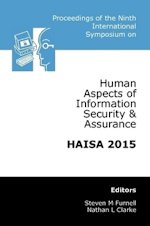In 2014, we launched our open-access repository which offers full text access to conference proceedings from many of our events including the INC and HAISA series. These papers are free to access and distribute (subject to citing the source).
» Openaccess proceedings » Ninth International Symposium on Human Aspects of Information Security & Assurance (HAISA 2015)
 | Ninth International Symposium on Human Aspects of Information Security & Assurance (HAISA 2015) |
Title: Examining Attitudes toward Information Security Behaviour using Mixed Methods
Author(s): Malcolm Pattinson, Marcus Butavicius, Kathryn Parsons, Agata McCormac, Cate Jerram
Reference: pp57-70
Keywords: Information Security (InfoSec), InfoSec Behaviour, Repertory Grid Technique (RGT), Theory of Planned Behaviour, Attitude, Mixed Methods, Hybrid
Abstract: This paper reports on a mixed-method research project that examined the attitudes of computer users toward accidental/naive information security (InfoSec) behaviour. The aim of this research was to investigate the extent to which attitude data elicited from repertory grid technique (RGT) interviewees support their responses collected via an online survey questionnaire. Twenty five university students participated in this two-stage project. Individual attitude scores were calculated for each of the research methods and were compared across seven behavioural focus areas using Spearman product-moment correlation coefficient. The two sets of data exhibited a small-to-medium correlation when individual attitudes were analysed for each of the focus areas. In summary, this exploratory research indicated that the two research approaches were reasonably complementary and the RGT interview results tended to triangulate the attitude scores derived from the online survey questionnaire, particularly in regard to attitudes toward Incident Reporting behaviour, Email Use behaviour and Social Networking Site Use behaviour. The results also highlighted some attitude items in the online questionnaire that need to be reviewed for clarity, relevance and non-ambiguity.
Download count: 3141
How to get this paper:


PDF copy of this paper is free to download. You may distribute this copy providing you cite this page as the source.
